Strangehold is a weekly podcast by New Hampshire Public Radio that is determined to grapple with the questions of why does a state with a population of 1.356 million people, 90 percent of who are white, always gets to vote first in the presidential election cycle? And is it fair for New Hampshire to continue its tradition of voting first when the state is not truly representative of the demography of the United States?
Going Platinum with 1 Million Downloads
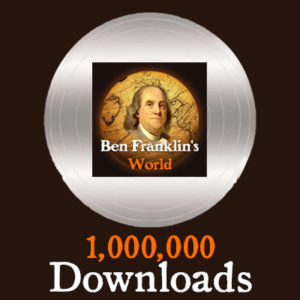 Ben Franklin's World hit a big milestone this past weekend. On Saturday, September 17, 2016, it reached and surpassed 1 million downloads.
Or as I like to joke, Ben Franklin's World went platinum.
Ben Franklin's World hit a big milestone this past weekend. On Saturday, September 17, 2016, it reached and surpassed 1 million downloads.
Or as I like to joke, Ben Franklin's World went platinum.
In the world of podcasting, reaching and surpassing 1 million downloads is a remarkable achievement. What make's Ben Franklin's World achievement of this goal even more remarkable is that the show reached this milestone as an independently produced podcast before its 2-year anniversary (Oct 7). Also, it achieved these downloads without inflationary tactics such as "tweet bombing" and without paid advertising.
There are two main reasons the podcast has been as successful as it has over the last (almost) two years: First, it offers high-quality content that listeners enjoy enough to recommend to others. Second, I've had a lot of help from friends, colleagues, and listeners.
The People Behind-the-Scenes
Darrell Darnell of Pro Podcast Solutions has served as the audio engineer and assistant editor for the show for the last year. He works hard to ensure that each episode sounds great and as good as it possibly can. Given my sensitive ears this not always an easy feat to achieve.
The Omohundro Institute of Early American History and Culture has played a sizable role in the evolution of the show. Last year, they helped me troubleshoot a lot of quick-growth "hiccups" that developed in the back end of the podcast. This year, they've helped shape the content side. They've done this with our "Doing History: How Historians Work" series and in providing silent, gentle encouragement to do better. (They asked me to keep doing what I was doing, but there's something about producing a podcast for the organization that publishes the leading journal in your field, and many of its leading books, to make you ask "what can I do to produce better episodes?")
Many friends and colleagues have listened to me talk ad nauseam about both history and podcasting. However, three friends and colleagues have gone above and beyond serving as sounding boards for this project: Sara Georgini, Joseph Adelman, and Karin Wulf. I can safely say all three now know more about podcasting and its technical workings than they ever thought they wanted to know.
My partner Tim Wilde also knows more about podcasting, digital media, and how they can complement history than he ever wanted to know. Tim has supported this project both literally and figuratively since I came up with idea to start a podcast. Not only did he make the project financially feasible for more than a year, he has also spent many nights and weekends being silent while I record, writing me code that integrates apps with the BFWorld website, and fixing technical issues that arise when WordPress, RSS feeds, and other code breaks. This is to say nothing of how he has yet to comment on the fact that Ben Franklin's World often turns him into a "podcast widower."
Listeners have been central in helping Ben Franklin's World grow from 288 downloads in October 2014 to a monthly average of over 68,000 downloads today. BFWorld listeners serve as the enthusiastic advertising department for the podcast. They recommend the show to their friends, family, and acquaintances because they love history, the guest historians and the topics they discuss in episodes, and that I work hard to provide them with high-quality content.
Plus, listeners have helped in other ways too. Some listeners go the extra mile to help support the show's production costs with financial donations. Many more offer support by sending e-mails, tweets, and Facebook posts of encouragement.
Podcasting is way more work than I ever thought it would be and the production schedule of a weekly show is downright grueling. There are weeks when I think about airing old content, skipping an episode, or reducing the production schedule to every other week because I'm exhausted and want to work on my book projects. There are also weeks where my perfectionist tendencies kick in and I fret over the quality of my work. Without fail, whenever I fall into a tired, mental rut, my inbox and social media streams start bulging with listener feedback telling me how much they love the show and feel enriched by it. And without fail, these words of encouragement spur me on.
I am sincerely grateful to all of these friends for their assistance.
Episode 100 & Beyond
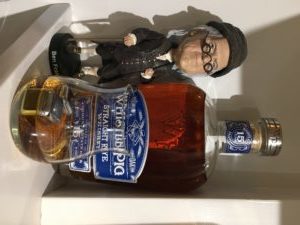 When episode 100 airs tomorrow (Sept 20), I will enter a different level in the podcasting space; the level that says I'm statistically likely to continue podcasting for another 1-3 years for a total of 3-5 years. It will be interesting to see if this holds true or if Ben Franklin's World and I become a statistical outlier. Time will tell.
When episode 100 airs tomorrow (Sept 20), I will enter a different level in the podcasting space; the level that says I'm statistically likely to continue podcasting for another 1-3 years for a total of 3-5 years. It will be interesting to see if this holds true or if Ben Franklin's World and I become a statistical outlier. Time will tell.
Uncharacteristically, I'm mostly focused on the moment rather than on the future and all the work that needs to be done. Tim and I marked 1 million downloads by splurging on an expensive bottle of whiskey that we will enjoy for months to come. Next month, we will celebrate the show's 2-year anniversary with a long weekend away from Ben Franklin's World.
Why I'm Running a Half-Marathon: Cancer Sucks!
 On Sunday, October 9, 2016, I'm running my first half marathon.
Why?
On Sunday, October 9, 2016, I'm running my first half marathon.
Why?
Cancer sucks and we need to support those who are working hard to find a cure.
How I Became a Runner
If we've met, it may surprise you that I run. Frankly, it surprises me.
I've never liked running. Yet, I started to run in March 2016 as between travel and schedule changes at my yoga studio, I needed an activity that would focus and quiet my ever chatty brain.
At first, running was tough. I wasn't out of shape, but I wasn't in running shape. I'd tire after a mile or mile and a half, but I kept at it and my endurance increased. By May, my short run had lengthened to 5 or 6 miles. Today it is 7-7.5 miles.
I'm not fast, but I don't need to set a world record to enjoy the quieting effect running has on my brain.
In April, I told a good friend that I was running and how I had come to enjoy it. She responded that it would be only a matter of time before I signed up for a marathon. I told her she was crazy. Then in July, I saw the sign-up for the Boston Athletic Association Half Marathon and felt a strong urge to do it.
Dana Farber Cancer Institute
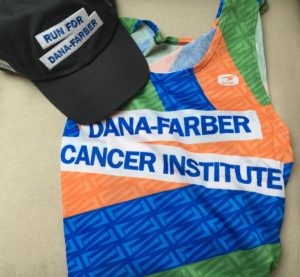 The desire to run this particular half marathon has to do with the fact that it's a fundraiser for the Dana Farber Cancer Institute.
The desire to run this particular half marathon has to do with the fact that it's a fundraiser for the Dana Farber Cancer Institute.
The Dana Farber Cancer Institute is one of the oldest research centers for cancer. It began in 1947 as the Children's Research Foundation Center. In 1969, it began seeing patients of all ages. Today, Dana Farber supports more than 300,00 patient visits per year and is involved with approximately 700 clinical trials.
Cancer has made some of my good friends and their family members sick. It has also taken a few of their lives. More immediately, cancer came for my partner Tim in 2013.
My Grudge Against Cancer
2013 was a tough year. In January we lived through a winter move into our new home; in April we lived through the Marathon Bombing; and in August we found we would have to live through cancer too.
Doctors diagnosed Tim with thyroid cancer. They told us he was lucky because thyroid cancer is the "good cancer." It is relatively easy to treat by removing the thyroid and with a pill dose of radiation. It also rarely moves outside of the thyroid. With that said, Tim's tumor complicated things.
When we met with Tim's surgeon, she informed us that he had a large tumor that had grown over his carotid artery (the artery that supplies blood to the brain) and had partially engulfed it. She was confident she could remove the tumor and Tim's thyroid, but the tumor would make the procedure more complicated.
Although Tim had the "good cancer," we had to discuss many uncomfortable and suddenly very real scenarios given the placement and size of his tumor: In the event he went into a coma, how long would he want to be on life support? If he died, did he want his body buried or cremated? Did he want a Catholic service or something non-religious? Where would I find the master list of his passwords so I could access computers, files, and bank accounts? Was our will up-to-date? What information would I need to claim his life insurance policy? Who should I reach out to at Google to claim his corporate life insurance policy and his death benefit (half his salary for 10 years provided I don't re-marry)? What did I need to know to take over our finances?
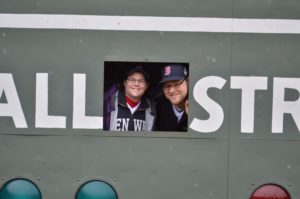 Needless to say, all of this was a lot to take in, especially as we weren't talking about abstract scenarios.
Needless to say, all of this was a lot to take in, especially as we weren't talking about abstract scenarios.
The day of Tim's surgery was torturous. If you've never experienced the wait of a loved one's surgery, you're lucky. The clock slows and you can't do anything to speed it up. Moreover, you can't really read or absorb information because you're distracted with wonder about how the procedure is going.
Tim's surgery finished 2 hours later than expected, but it was a success. Days later we learned that the biopsy on his tumor revealed that it was actually pre-cancerous so he didn't need the radiation pill.
Our experience with cancer was privileged. We had great health insurance and support from Tim's employer. Our health insurance gave us a choice in who would be his surgeon and since we live in Boston--a city known for its frigid winters and world-class hospitals--our choices ranked among the top thyroid specialists in the world. Plus, if something had gone wrong-- if Tim's tumor had been cancerous or if that cancer had spread-- we would have had access to a top cancer research and treatment center, Dana Farber.
Why I'm Running: It's a Fundraiser
I'm running the Boston Athletic Association Half Marathon to raise money for Dana Farber because it's the least I can do for an organization that helps so many people--patients and their families--get through one of the toughest and most stressful periods of their lives. They can't save all their patients yet, but they give them a fighting chance. And hopefully one day they will find a cure so no one has to figure out what they will do without their parent, child, sibling, spouse, or friend or what their loved ones will do without them.
If you'd like to support Dana Farber's efforts, please support my run with a donation.
Ben Franklin's World: Academy Award Nominee for Best History Podcast
It's been a BIG week for Ben Franklin's World. On Monday, May 23, the show received its first award nomination: "Best History Podcast" from the Academy of Podcasters. The award is the equivalent of a podcast Oscar and Academy judges award it based on craft.
The Academy nominated 10 podcasts for the award. The top 5 podcasts in iTunes’ history category received automatic bids and the Academy voted in the other 5 nominees.
Ben Franklin's World will be judged alongside powerhouse podcasts such as NPR's Radio Diaries, Lore (which HBO will turn into a television show), The Art of Manliness, and, of course, Dan Carlin's Hardcore History--the most popular history podcast, which receives 3 million downloads per episode.

Admittedly, it took a few hours for the fullness of the news to sink in. Ben Franklin's World is successful, but it's not yet a "Top 5" podcast in iTunes’ history category. It doesn't offer fancy storytelling or presentist diatribes or opinions about history (which are very popular), it offers two historians talking about well-researched early American history in a way that offers listeners insight into the world of professional historians and historical ideas they can think about.
My fellow podcasters voted this very different type of history podcast as standing among the 10 best in its category. Not only do they like the content we historians provide, but they appreciate the craft that goes into each episode.
The craft of podcasting was not something I fully appreciated until I started Ben Franklin’s World. Since mid-2014, I have listened to podcasts like most of us read history books: I listen for information, but I also pay attention to structure, interview and transition techniques, and other elements of craft. I take notes on what I like and try to implement these techniques into Ben Franklin’s World.
Over the last 5-6 months, the craft of Ben Franklin’s World has improved a lot. I think there are two reasons for this improvement. First, like any craft it takes time, study, and practice to get a feel for what you are doing. Second, I have become very involved in editing the show.
Once I realized that podcasts can provide historians with another outlet for scholarly work, I began approaching each episode as a serious journal article. I apply the same skills we use when we write articles to episodes: I research my guest and their work, I choose which information to include or cut, I rework questions for clarity, and I edit to make the flow or language of episodes tighter. Each BFWorld episode receives at least 3 editing passes: My initial edit, an edit by my audio engineer, and a final proof where we find and fix what we missed during the first two passes.
This isn't ground-breaking work. Historians work like this all the time and many NPR hosts follow a similar production process. But this work is something that is a bit new to interview-driven podcasts and to history podcasts in particular.
Realistically, I don't know if Ben Franklin's World will be able to overtake the giants in the category to win the award. Although I'm considered an “old podcaster,” I still feel like I am getting my feet wet in this medium and have so much to learn. With that said, I also like Ben Franklin’s World’s chances. Ben Franklin’s World will have a very unique, if meta, submission: a 5-minute clip of historians talking about their craft for an award based on craft.
I have decided that the submission I will send to the judges will come from one of two episodes, both of which are from the “Doing History” series with the Omohundro Institute. I'm proud of this series and its creative challenges have pushed me to improve in both my craft as a historian and as a podcaster. Additionally, these episodes represent the work of everyone on my small team: me, Darrell Darnell, and the OI.
Darrell is my fantastic audio engineer. He not only assists with editing the show, but he works to ensure that each episode sounds as good as it can be. The folks at the OI have also had a huge impact on Ben Franklin’s World. In addition to sponsoring and assisting with the production of the “Doing History” series, they have helped me professionalize and manage the show's backend so the podcast can better serve the profession. If Ben Franklin’s World wins this award it will be because of this team and it’s important that everyone's contribution be represented in the submission.
***
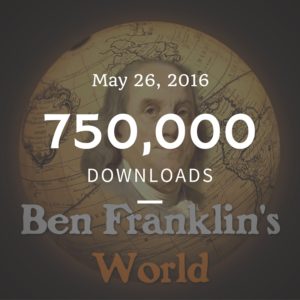 Aside from the Academy nomination, Ben Franklin's World hit another HUGE milestone this week. It surpassed 750,000 downloads.
Aside from the Academy nomination, Ben Franklin's World hit another HUGE milestone this week. It surpassed 750,000 downloads.
If the monthly average of about 60,000 downloads stays the same, Ben Franklin’s World will surpass 1 million downloads sometime during late summer or early fall.
Most podcasts never make it beyond episode 7 and many podcasters will podcast regularly for close to a decade before they reach the 1 million download mark. And yet, Ben Franklin's World may make it there in less than 2 years. This is awe inspiring.
The Bobblehead Collection
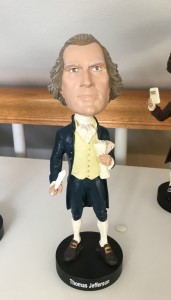 January 7 is National Bobblehead Day.
January 7 is National Bobblehead Day.
In honor of the occasion, I offer you a look at my historic bobblehead collection.
My collection consists of 14 bobbleheads. It started in the late 2000s with Thomas Jefferson.
The collection started with Jefferson because we share a birthday (April 13). Jefferson's birth (and mine) are the only interesting historical happenings on that day. (Seriously, April 13 is a historically boring day. April 12, 14, and 15 are action packed.)
After Jefferson, I acquired John Adams, one of my favorite historical figures.
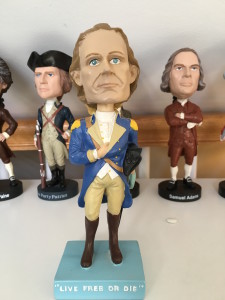
For several months, Jefferson and Adams lived on top of my office bookcase. Friends and family always commented on them when they visited and for the next several Christmases and birthdays I received bobbleheads. Bobblehead gift-giving continues today: this past Christmas (2015) my Dad gave me John Stark, Continental Army colonel and New Hampshire general.
The Collection
Most of my bobbleheads come from a company called Royal Bobbles. However, Henry Hudson and John Stark have different manufacturers.
I picked up Henry Hudson at a Tri-City ValleyCats baseball game in Troy, New York in 2009, the quadricentennial of Hudson's voyage up the North or Hudson River.
My Dad found John Stark at the New Hampshire Historical Society.
In display order:
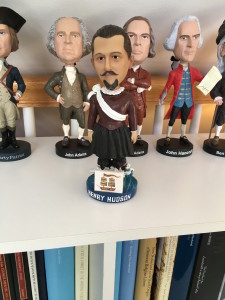
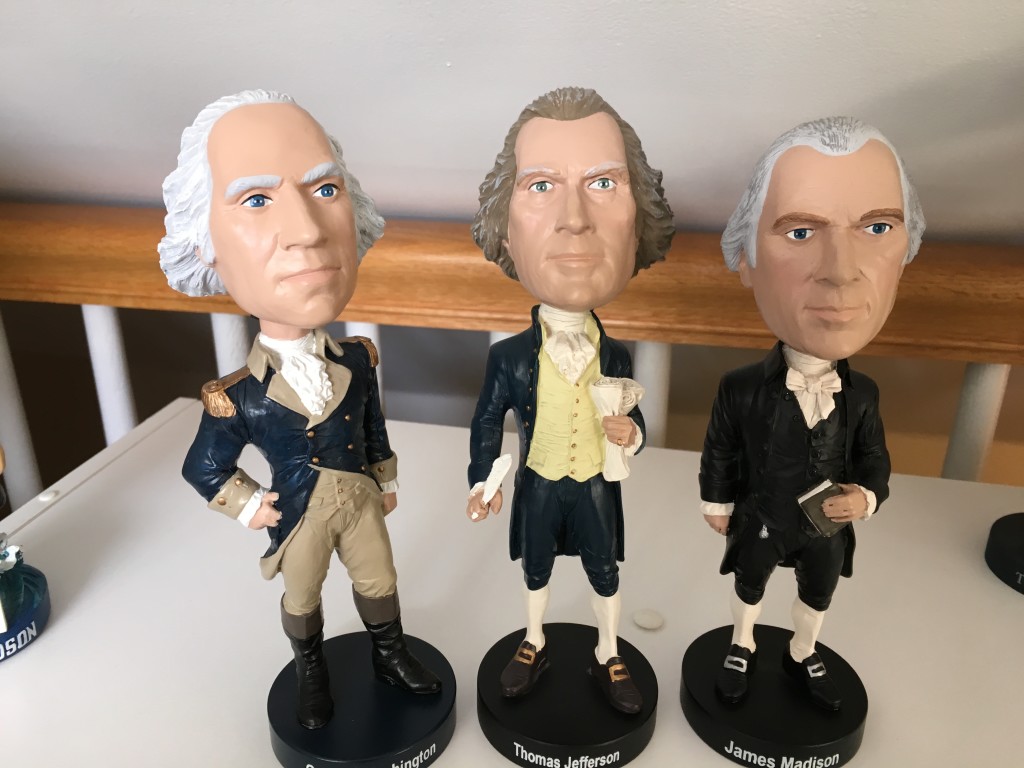
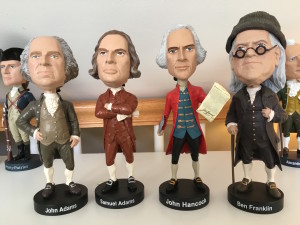
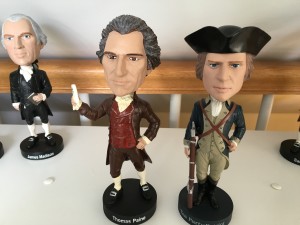
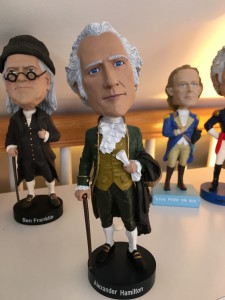
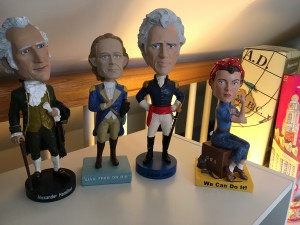
My Wishlist
You may have noticed from the photos that my collection is largely male. I have written to Royal Bobbles over the years to ask if they would make a Founding Mothers series. They seemed intrigued, but it's 2016 and I am still waiting.
I would love to add Abigail Adams, Martha Washington, Dolly Madison, and King George III to my collection.
Yes, King George III. If you have seen Hamilton the Musical, you understand how perfect this would be. Remember Jonathan Groff's shaking head? I watched the show and thought "King George III would make an awesome bobblehead."
Related to the Collection
In addition to my bobbleheads, I also have a bust of John Hancock. A friend gifted him to Tim and I as a wedding present.
In our household, Hancock always roots for the Boston Red Sox.
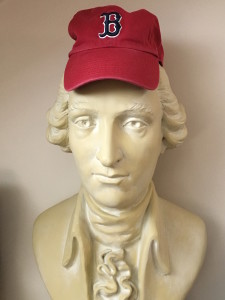
Why I Love My Collection
I love my bobblehead collections because it starts conversations. Every time someone visits my home they see it and comment. Their comment leads to a conversation about history, the founders, and the American Revolution. Over the years, I have had great conversations with friends, family, plumbers, electricians, and other contractors.
The bobbleheads also elicit conversations on social media. On occasion, Tim likes to move my bobbleheads around. Since we saw Hamilton the Musical, I often find Hamilton and Jefferson facing each other with Washington, Madison, and the Bostonians gathered round to watch Hamilton and Jefferson engage in a "cabinet meeting." Sometimes I post pictures of the bobbles' new position on Twitter and Facebook. Many followers comment on the photos.
I love these conversations and I can't wait to have them with my niece and nephew when they get older. I know it is only a matter of time before they ask questions about my "toys." When they do, we will have some fun with history.
Share Your Collection
I showed you mine, now let's see yours!
What historic or other bobbleheads are in your collection?

